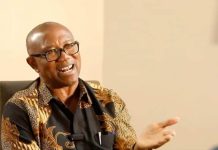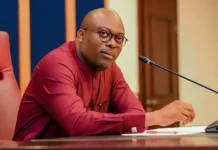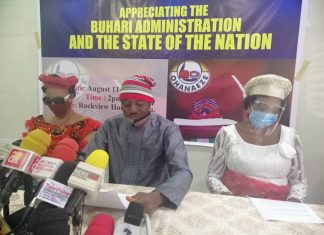In an interview with OLORUNDARE ENIMOLA, road safety advocate and GRA Empowerment Foundation founder/president Mr. Gabriel Rotimi Aroge described how his organization is using cycling as a workable way to remove the cost of transportation to schools for underprivileged public school students through an initiative he called “Cycle2School Plus (C2S+).” A thousand bicycles will be donated during the pilot project’s launch in September and October. Quotes:
Tell us a little bit about yourself, sir.
I am Gabriel Rotimi Aroge, the GRA Empowerment Foundation’s founder. In addition to advocating for the Sustainable Development Goals (SDG), I also support non-motorized transportation and road safety.
I’m a social entrepreneur and design thinker who is enthusiastic about innovative solutions and their impact on communities, particularly those that empower marginalized kids.
Tell us about the causes that motivated your lobbying activity.
Our work has several facets. As a social enterprise developer and product designer, I specialize in leveraging cycling as a workable way to improve educational access for underprivileged Nigerian public school students. Our program, Cycle2School Plus (C2S+), will offer free, secure transportation to students—particularly girls—who are hampered by lengthy and hazardous walks to school. Its pilot phase is scheduled to begin in September or October.
An unfortunate accident at the Agric Bus Stop in Ikorodu on October 21, 2006, which claimed the lives of over 100 persons, gave rise to this advocacy.
As the sole survivor, my wife spent a year recuperating. This profound loss in my life sparked my mission. I decided to use creativity and grassroots empowerment to make a difference after realizing the seriousness of the UN Decade of Action for Road Safety.
Since our target beneficiaries are members of the most vulnerable and endangered road user groups, promoting the safety and improvement of walking and cycling is central to our development.
Due to Nigeria’s low level of road safety education, cyclists and pedestrians are frequently presented with challenges on the road by unfriendly, untrained, and hostile drivers.
We think we can be “the change” in tackling the low level of road user illiteracy in Nigeria by utilizing a platform such as Cycle 2 School Plus.
We are implementing C2S+ because we think it is necessary to democratize, decentralize, and enterprise road safety.
Do your audience and partners understand what you’re saying?
Yes, but there’s still opportunity to improve. We see our vision as being in line with SDGs 1, 3, 4, 5, 8, 11, 13, 16, and 17. Through a single scalable platform, we are tackling poverty, gender equality, decent work and economic growth, poverty alleviation, health and well-being, quality education, sustainable cities, climate action, peace justice, and strong institutions and partnerships.
The biggest issue we are now facing is reorienting Nigerian drivers; funding for a program aimed at changing their behavior is desperately needed to assist them recognize the efforts of law enforcement.
According to our estimates, 70% of people will support our initiative; the remaining 30% will depend on how effectively we present cycling as a revolutionary option. Leaders in the business sector and policymakers need to realize that this is a need, not an extravagance.
Which of your accomplishments to date stand out?
At the Sussex Innovation Centre in the United Kingdom, the Executive Director of ReCycle Bikes was hosted in Africa.
conducted a work visit to the Colchester, UK, warehouse of ReCycle. Worked with the Federal Road Safety Corps (FRSC) to host the 8th UN Global Road Safety Week and arranged the first-ever visit to Nigeria by ReCycle’s Executive Director in February 2025.
In 2025, we commemorated World Bicycle Day alongside FRSC and other collaborators. designated brand ambassadors, such as Afitz Bakare, a former national cycling champion.
recruited Dr. Charles O’Tudor, a brand strategist, as a mentor and fundraising coordinator.
After receiving a contribution of 1,000 bicycles and international assistance to bring our first container of 500 bikes into Nigeria, we now want local support to finish the program’s implementation plan.
How are your operations financed?
Our greatest asset is our human capital, which includes partners and volunteers who have years of pro bono experience. Over 500 bikes were shipped to Nigeria, and ReCycle UK paid for all of the expenses.
Over £10k was spent on a company incubation program sponsored by the Sussex Innovation Centre. In addition to providing technical support for our operations today, Brighton Bike Hub trained me as a volunteer.
If we had to pay for all of these out of pocket, the price would be very high. The Brighton Bike Hub, where I first volunteered as a mechanic apprentice during my Master of Science program at the University of Sussex, introduced me to Re-Cycle Bike to Africa, our main partner, who has contributed 1,000 bikes to support the start of our pilot program in Lagos.
These international partners might help me without knowing who I was or where I came from. They went to Nigeria to confirm our allegation, and they are going to press even harder than they have in other African nations since this cause is so admirable.
However, we need Nigerian partners to maintain this momentum. We are encouraging banks, insurance companies, FMCG companies, telecom companies, and charitable institutions to participate in this momentous endeavor.
With annual transportation costs of up to N90,000, education is not free. This burden will be removed with C2S+.
We will be introducing a school-children bicycle fleet for the first time, which will provide them with free bicycle service for the duration of their attendance.
You would assume that free education is what you hear. What about transportation? And is that free? This ongoing daily expense, on the other hand, typically causes many students to drop out of school, while those who are able to do so must trek for a considerable amount of time and in a hazardous manner to get to school in a staggered pattern. This does not result in the exceptional outcome and optimal performance that these children would have if they had been given the same opportunities as their peers.
Regarding bike infrastructure, how would you advise the Nigerian government to proceed?
Though behavioral change is more vital, infrastructure is crucial.
Campaigns for road safety, policy enforcement, and public education should come first. Prior to the effectiveness of any infrastructure, we must address driver aggression and risky driving practices.
Read Also: Economic Growth Not Felt in Markets as Prices Stay Elevated
Furthermore, bike lanes and accessible pathways need to be incorporated into urban design for cities like Lagos. Complete implementation of LAMATA’s Non-Motorized Transport (NMT) policy is required. We must, however, make safe use of what we have.
How can we lessen Nigerian traffic accidents?
All users of the road should get road safety education. Enforce traffic regulations and penalize infractions; justice serves as a deterrence.
From now on, educate the future generation in schools. Advocate for walking and bicycling as practical modes of transportation.
Incorporate and promote SDG 16 (Peace and Justice) into the governance of transportation.
Our Cycle2School+ initiative will help today’s drivers get ready for tomorrow.
Better road safety measures, such as speed bumps and signage, should be implemented, and traffic laws should be enforced more strictly. In addition to reducing the number of cars on the road, encouraging cycling can also help minimize the likelihood of accidents.
What are the financial advantages of cycling in Nigeria?
It is affordable: It lowers transportation expenses for low-income families.
It’s healthy since it lowers medical costs and encourages fitness.
Eco-friendly: Reduces emissions and safeguards our climate.
It’s a company: Sparks nearby repair businesses, training facilities, and rental properties.
Congestion in densely populated places like Lagos is reduced, which makes it wise.
How do you envision the GRA Empowerment Foundation in five years?
By 2030, we hope to be the most prominent non-motorized transportation advocate in Nigeria, with a presence in each of the 36 states.
We intend to: Establish training hubs in collaboration with universities (such as LASU, UNILAG, and NITT). Create a nationwide corps of volunteers. Establish cooperatives for community-owned bicycle repair.
Make scholarships available via our impact tracking platform. Expand school-based Road Safety Clubs by working with FRSC.
What last remarks would you like to make to philanthropists and the private sector?
Despite without having to know us personally, international partners have fulfilled their obligations. They made an investment after seeing a compelling concept. Nigeria must now take the initiative. Together, we can collaborate with state governments, impact investors, Rotary Clubs, global corporations, and good-willed citizens. By working together, we can provide free, secure, and respectable mobility for education.
Join us and show your support. A single bicycle has the power to permanently alter a child’s life.
Join Television Nigerian Whatsapp Now
Join Television Nigerian Facebook Now
Join Television Nigerian Twitter Now
Join Television Nigerian YouTUbe Now





